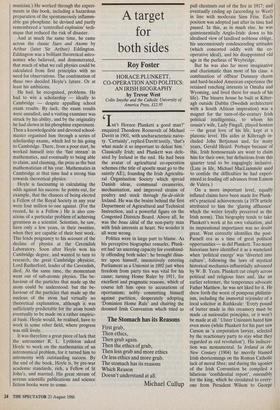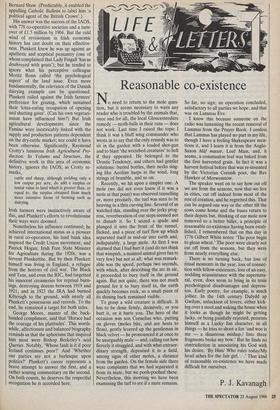A target for both sides
Roy Foster
HORACE PLUNKETT, CO-OPERATION AND POLITICS: AN IRISH BIOGRAPHY by Trevor. West
Colin Smythe and the Catholic University of America Press, f12.95
Isn't Horace Plunkett a good man?' enquired Theodore Roosevelt of Michael Davitt in 1901, with uncharacteristic naive- ty. 'Certainly', replied Davitt testily, 'that's what made it so important to defeat him.' Classically Irish; and Plunkett was defe- ated by Ireland in the end. He had been the avatar of agricultural co-operation schemes (the title of apostle must go to the saintly AE), founding the Irish Agricultu- ral Organisation Society which spread Danish ideas, communal creameries, mechanisation, and improved strains of poultry and stock through fin-de-siecle Ireland. He was the brains behind the first Department of Agricultural and Technical Instruction, and a powerful figure on the Congested Districts Board. Above all, he was the beau ideal of the non-party man with Irish interests at heart. No wonder it all went wrong.
Politics were in large part to blame. As his perceptive biographer remarks, Plunk- ett had 'an unerring capacity for evenhand- ly offending both sides': he brought disas- ter upon himself, insensitively entering Parliament as a Unionist in 1892 just when freedom from party ties was vital for his cause; turning Home Ruler by 1911, for excellent and pragmatic reasons, which of course left him open to accusations of oportunism; nobly committing himself against partition, desperately adopting `Dominion Home Rule' and chairing the doomed Irish Convention which tried to pull chestnuts out of the fire in 1917; and eventually ending up (according to West) in line with moderate Sinn Fein. Each position was adopted just after its time had passed. In this, as, in much else, he was quintessentially Anglo-Irish: down to his idealised view of landlord noblesse oblige, his unconsciously condescending attitudes (which consorted oddly with the co- operative ideal), and his disappointed old age in the purlieus of Weybridge.
But he was also far more imaginative and charismatic than most of his class: a combination of offbeat Dunsany charm and hard-headed American experience (he retained ranching interests in Omaha and Wyoming, and lived there for much of his life). The bizarre house he built at Kilter- agh outside Dublin (Swedish architecture with a South African inspiration) was a magnet for the turn-of-the-century Irish political intelligentsia, to whom his cousin's wife, Lady Fingall, played hostess — the great love of his life, kept at a platonic level. His aides at Kilteragh in- cluded John Betjeman and, for many years, Gerald Heard. Perhaps because of this, Irish homosexuals are wont to claim him for their own; but definitions from this quarter tend to be engagingly inclusive. (Late in life, Michael MacLiammoir used to confide the difficulties he had experi- enced in fending off advances from Eamon de Valera.) On a more important level, equally inflated claims have been made for Plunk- ett's practical achievements (a 1978 article attributed to him the 'glaring affluence' which the writer loyally perceived as the Irish norm). This biography tends to take Plunkett's work at his own valuation, and its inspirational importance was no doubt great. West correctly identifies the post- Parnell era as a time of great political opportunities — as did Plunkett. Too many historians have identified it as a wasteland when 'political energy' was 'diverted into culture', following the laws of mystical historical mechanics influentially advanced by W. B. Yeats. Plunkett cut crisply across political and religious lines and, like an earlier reformer, the temperance advocate Father Matthew, he was not liked for it. He drew forth the worst of pompous philistin- ism, including the immortal rejoinder of a local solicitor in Rathkeale: 'Every pound of butter made in this creamery must be made un nationalist principles, or it won't be made at all.' Ulster Unionists hated him even more (while Plunkett for his part saw Carson as 'a corporation lawyer, selected by the reactionary party to stay what they regarded as red revolution'). His indiscre- tion was monumental. In Ireland in the New Century (1904) he merrily blamed Irish shortcomings on the Roman Catholic lack of moral fibre; and during the agonies of the Irish Convention he compiled a hilarious 'confidential report', ostensibly for the king, which he circulated to every- one from President Wilson to George Bernard Shaw. (Predictably, it enabled the appalling Catholic Bulletin to label him 'a political agent of the British Crown'.) His answer was the success of the IAOS, with 778 co-operative societies and a turn- over of £1.5 million by 1904. But the cold wind of revisionism in Irish economic history has cast doubt on their effective- ness. Plunkett knew he was up against an apathetic and sceptical peasantry (one of whom complained that Lady Fingall 'has us desthroyed with goats'); but he tended to ignore what his perceptive colleague Moritz Bonn called 'the psychological aspect' of the land issue. Even more fundamentally, the relevance of the Danish dairying example can be questioned. Plunkett railed against the Irish farmers' preference for grazing, which sustained their lotus-eating occupation of opening and shutting gates'. (Can his own vegetari- anism have influenced him?) But Irish agricultural developments since the Famine were inextricably linked with the supply and production patterns dependent on the dry-cattle market; nor could it have been otherwise. Significantly, Raymond Crotty's luminous Irish Agricultural Pro- duction: Its Volume and Structure, the definitive work in this area of economic history, ignores the IAOS; as Crotty re- marks,
cattle and sheep, although yielding only a low output per acre, do add a surplus or rental value to land which is greater than, or equal to, the surplus obtained from much more intensive forms of farming such as dairying.
Irish farmers were instinctively aware of this, and Plunkett's efforts to revolutionise their ways were doomed.
Nonetheless his influence continued; he achieved international status as a pioneer in rural co-operation, his land bank idea inspired the Credit Union movement, and Patrick Hogan, Irish Free State Minister for Agriculture during the 1920s, was a fervent Plunkettite. But by then Plunkett himself was living in England, a refugee from the horrors of civil war. The Black and Tans, and even the RIC, had targetted his innocent creameries for reprisal burn- ings, destroying dozens between 1919 and 1921; and in 1923 the IRA had burned Kilteragh to the ground, with nearly all Plunkett's possessions and records. To the end, he remained a target for both sides.
George Moore, master of the back- handed compliment, said that 'Horace had the courage of his platitudes'. This worth- while, affectionate and balanced biography reminds us that the aphorisms that inspired him most were Bishop Berkeley's acid Queries. Notably, 'Whose fault is it if poor Ireland continues poor?' And 'Whether our parties are not a burlesque upon politics?' Plunkett's career represents a brave attempt to answer the first, and a rather souring commentary on the second. On both counts, he deserves the respectful recognition he is accorded here.











































 Previous page
Previous page